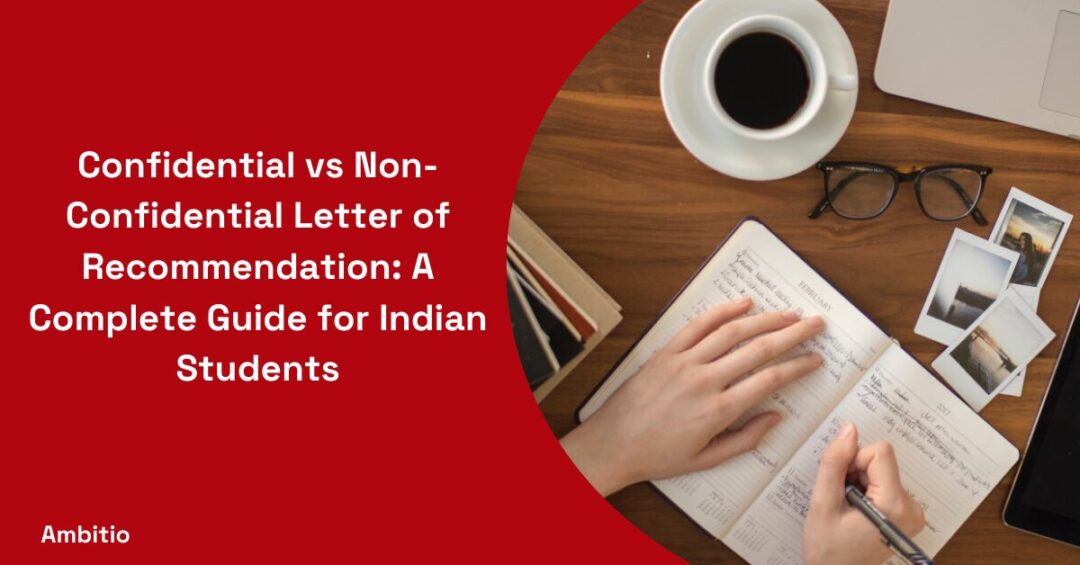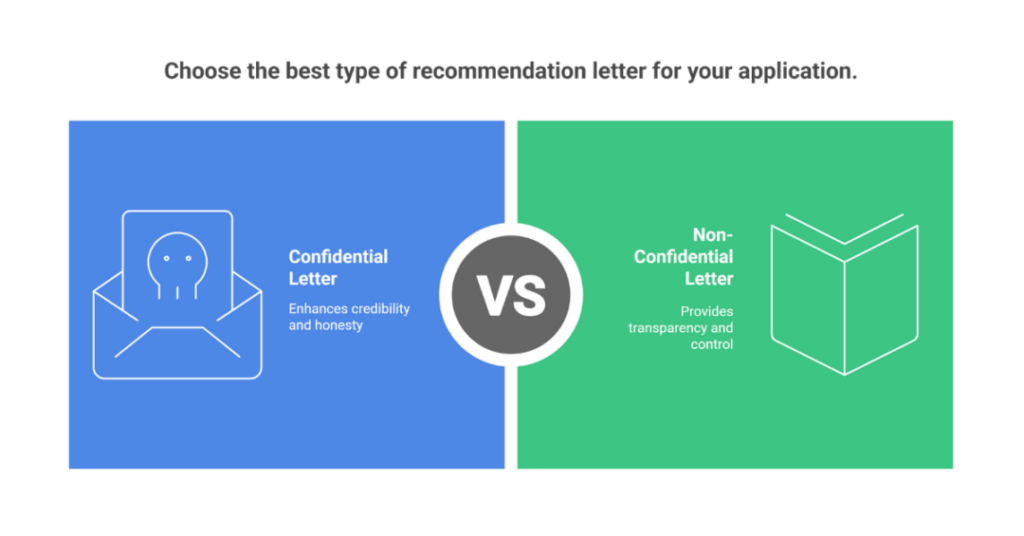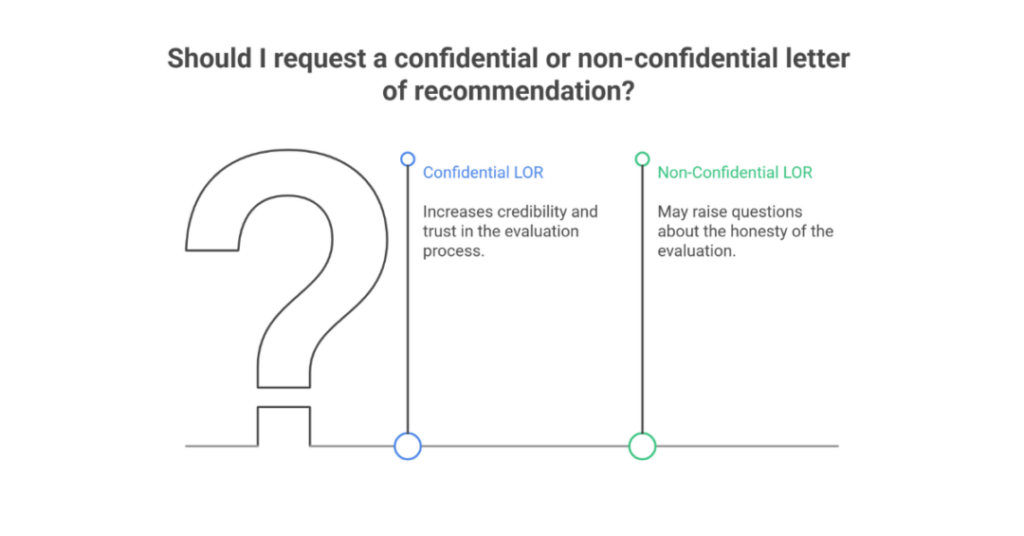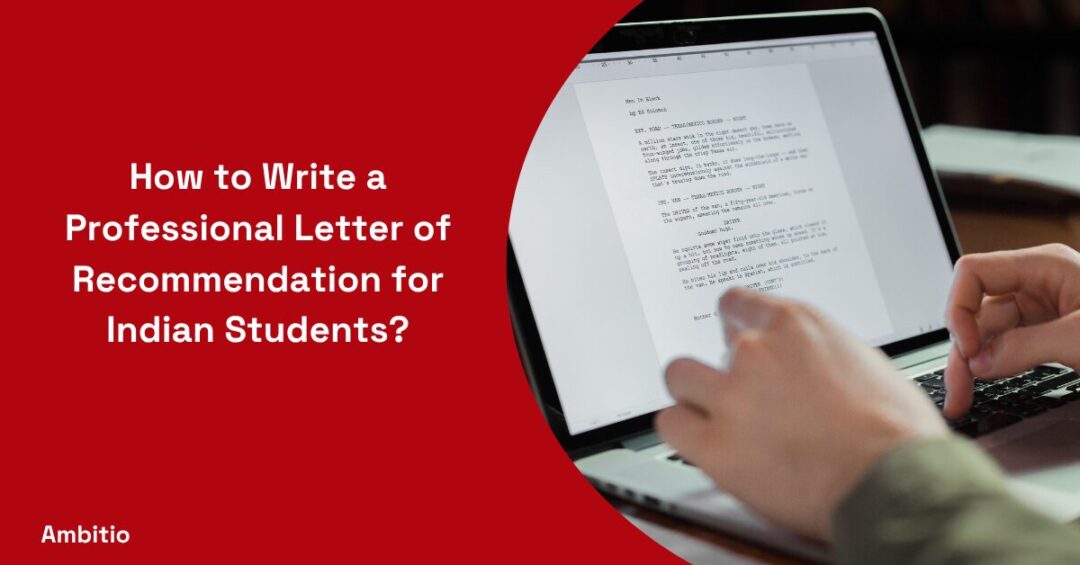15 July 2025
5 minutes read
Confidential vs Non-Confidential Letter of Recommendation: A Complete Guide for Indian Students

Key Takeaways
- Confidential vs non confidential letter of recommendation can influence your admit chances; confidential LORs are preferred by most top universities.
- Waiving your right to view the letter helps your recommender give honest, unbiased feedback that admissions committees trust more.
- Ask early, be clear, and guide your recommender to ensure your LOR adds real value to your study abroad application.
Did you know that over 75% of U.S. grad schools expect you to waive your right to view the letter of recommendation? Most Indian students don’t even realize this before they apply. Professors often decline to write letters unless you waive access, and that impacts your entire application.
In this guide, we break down the real differences between a confidential vs non confidential letter of recommendation so you can decide what helps your credentials and credibility, and what might quietly hurt your chances.
What is a confidential letter of recommendation?
A confidential letter of recommendation is a reference you submit as part of your graduate or professional school application, where you waive your right to view the letter under the Family Educational Rights and Privacy Act (FERPA).
This waiver allows recommenders, like a professor, advisor, or employer, to give honest and unbiased feedback. Most institutions and admissions committees prefer confidential letters of recommendation, as it signals that the applicant trusts the writer to highlight strengths without fear of criticism or pressure.
What is non confidential letter of recommendation?
A non-confidential letter of recommendation is a recommendation letter where the applicant chooses not to waive their right to view the letter, as allowed under FERPA (Family Educational Rights and Privacy Act).
While the content can still highlight your strengths and accomplishments, some letter writers may decline or feel less comfortable writing a positive letter. Many institutions and admissions committees prefer confidential letters, believing they offer more candid feedback and preserve the credibility of the application and evaluation.
Confidential vs Non Confidential Letter of Recommendation: What’s the Difference?
When it comes to graduate student admissions or fellowship applications, understanding the confidential vs non confidential letter of recommendation distinction is crucial. Your decision affects how your recommender writes the letter, and how admissions teams review the letter as part of your full academic profile.

Here’s a clear comparison to help you choose wisely:
| Feature | Confidential Letter of Recommendation | Non-Confidential Letter of Recommendation |
|---|---|---|
| Confidentiality | Maintained; applicant waives right to read the letter | Not maintained; applicant can review the letter |
| Recommender’s Comfort | Usually more comfortable writing a positive and honest letter | May hesitate or decline to write letters of recommendation |
| Credibility | Seen as more credible by law school, pre-health, and graduate programs | Viewed with caution by admissions due to possible bias |
| FERPA Waiver | Required; applicant explicitly waives rights | Not waived; rights retained under FERPA |
| Submission | Commonly submitted via portals like Interfolio | Can also be submitted, but often less preferred |
| Application Impact | Higher trust from supervisor, committee, and schools | May raise questions during application review |
| Best For | Students seeking strong academic or professional school applications | Limited use; sometimes used in job or internal evaluation settings |
| Pros and Cons | Pros: Honest feedback, stronger impact Cons: You can’t see it | Pros: You know what’s written Cons: May weaken letter strength |
| Role in Application | Critical part of the application alongside transcript and SOP | May still be considered but with less weight |
| Guideline | Always inform your recommender early and follow up before the deadline | Clarify if they’re okay with the non-confidential route |
Why Do Universities Prefer Confidential LORs?
Universities prefer confidential letters because they trust them to reflect honest, candid evaluations. When students waive their right to view the letter, recommenders usually feel comfortable writing a positive yet unbiased assessment, increasing the credibility of the letter submitted.
Whether you use Interfolio or upload directly, the way you submit the letter signals trust in the process. In the debate on confidential vs non confidential letter of recommendation, confidential ones help the admissions team distinguish authentic strength from forced praise, key in judging fit.

If you’re wondering how to send letters of recommendation to colleges or how to get letters of recommendation for grad school, remember: a good academic letter of recommendation format, typically 1–2 pages, carries more weight when it’s confidential.
Still confused about how long should a letter of recommendation be for college, whether it needs a date, or the difference between letter of recommendation and reference letter? Here’s a tip: ask your recommender early, and if needed, share an executive letter of recommendation sample to guide their draft.
Should Indian Students Opt for Confidential or Non-Confidential LORs?
For most Indian applicants, choosing a confidential letter is the smarter move. When applying abroad, a confidential vs non confidential letter of recommendation decision signals your trust in the recommender and boosts the letter’s credibility in the eyes of admission officers.
Whether it’s a letter of recommendation for student to study abroad, a letter of recommendation for student applying to grad school, or a letter of recommendation for higher studies, confidential LORs are preferred because they appear more genuine, unbiased, and professional to foreign universities.
How to Request the Right Type of Recommendation Letter as an Indian Student?
Navigating the confidential vs non confidential letter of recommendation decision starts with knowing how to ask for a letter of recommendation the right way. Start by choosing someone who knows your work well, professors, supervisors, or project mentors, and clearly request a confidential letter if you’re applying abroad. Most universities expect this for a strong and credible application.
If you’re wondering how to get letters of recommendation for grad school or how to send letters of recommendation to colleges, always ask at least 4–6 weeks in advance. Unsure what to say?
Here’s a tip: be respectful and professional, and if needed, follow up with a clear and polite message. Knowing how to politely remind someone about a letter of recommendation can save your deadlines without sounding pushy.
Conclusion
Choosing between a confidential vs non confidential letter of recommendation isn’t just a formality; it can influence how your entire application is perceived. For Indian students aiming for top universities, the right LOR strategy, timing, and recommender can make or break their dream admit.
Not sure how to craft the perfect LOR strategy or who to ask? Let Ambitio guide you. From profile building to personalized LOR planning, we help you position yourself where it matters most.
Ready to stand out, not stress out?
Book your free 1-on-1 consult with an Ambitio mentor today and build your dream admit letter by letter.
FAQs
What is the difference between a confidential vs non confidential letter of recommendation?
A confidential letter of recommendation is not accessible to the applicant, while a non confidential letter can be viewed by the applicant.
Which is preferred: confidential vs non confidential letter of recommendation?
Most institutions and employers prefer a confidential letter of recommendation as it is seen as more honest and unbiased.
Does choosing confidential vs non confidential letter of recommendation affect my application?
Yes, confidential letters are often given more weight, as reviewers believe they contain more candid feedback.
Can I ask my recommender to show me a confidential vs non confidential letter of recommendation?
No, you waive your right to see a confidential letter, but you can always discuss your application and background with your recommender beforehand.
Why do recommenders prefer writing a confidential vs non confidential letter of recommendation?
Recommenders feel more comfortable being candid and honest in a confidential letter, knowing the applicant will not see it.
Are there situations where a non confidential letter of recommendation is acceptable?
Non confidential letters are sometimes accepted, but they may be viewed as less credible or less valuable by selection committees.
How do I decide between a confidential vs non confidential letter of recommendation?
Consider the requirements of your application and discuss with your recommender; generally, confidential letters are the standard for most academic and professional opportunities.

You can study at top universities worldwide!
Get expert tips and tricks to get into top universities with a free expert session.
Book Your Free 30-Minute Session Now! Book a call now




























